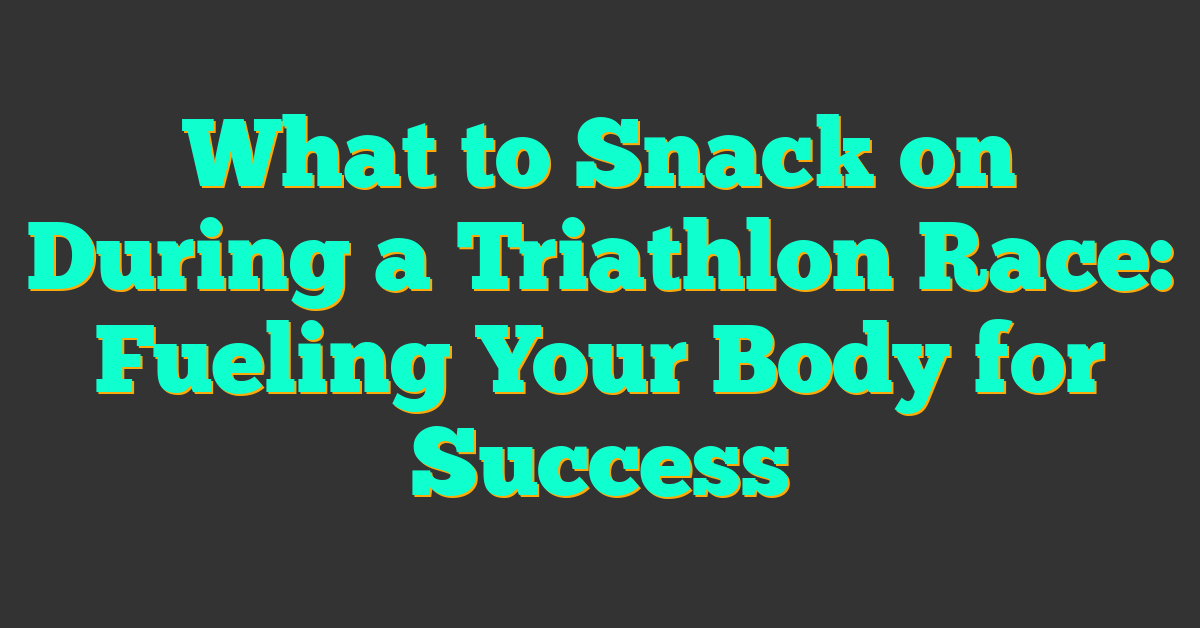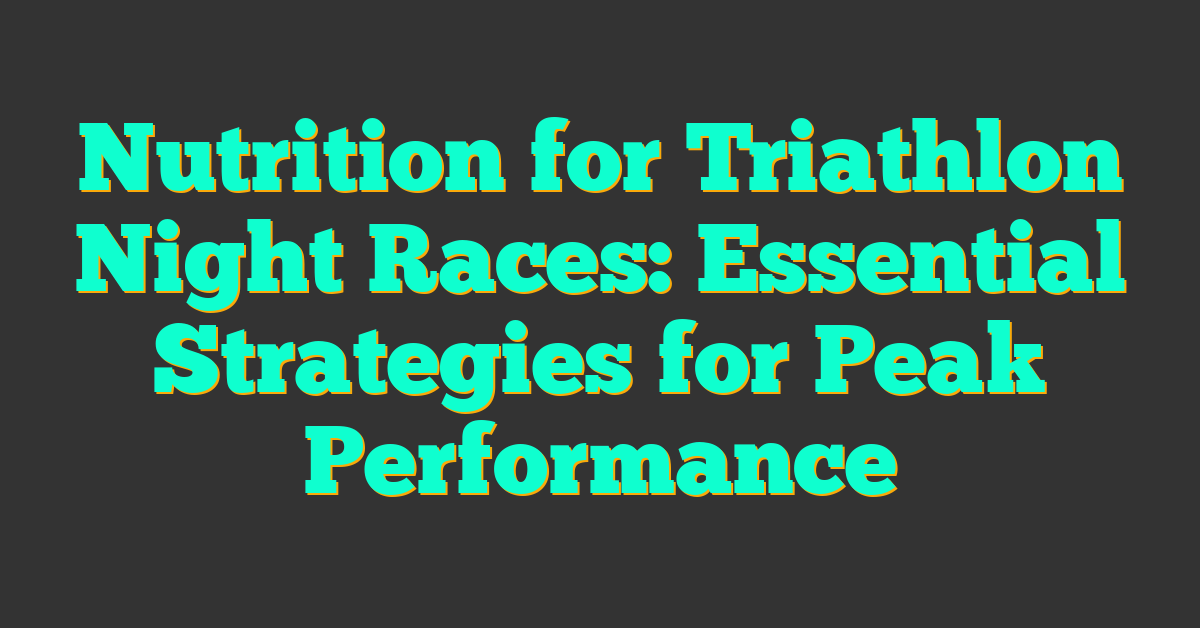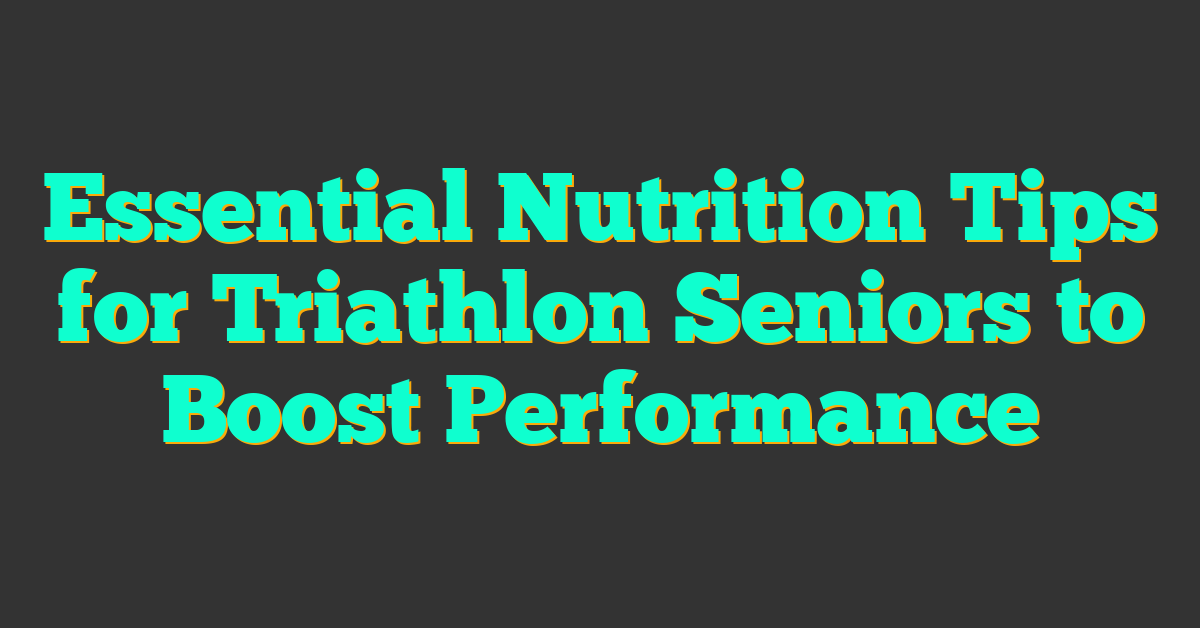Triathlons are one of the most challenging endurance sports that require a high level of physical fitness and mental toughness. Completing a triathlon requires a lot of energy, and proper nutrition is essential to fuel the body and maintain optimal performance throughout the race. To achieve this, you need to have a good understanding of triathlon nutrition and know what to snack on during the race.

Understanding triathlon nutrition is critical to achieving optimal performance. Your body needs energy to fuel your muscles, and this energy comes from the food you eat. The right nutrition can help you maintain your energy levels, prevent cramping, and avoid dehydration. Pre-race meal planning is essential to ensure that you have enough energy to complete the race. In-race snacking options are also important to maintain your energy levels and prevent hunger pangs.
When it comes to post-race recovery nutrition, your body needs to replenish the nutrients it lost during the race. A meal or snack that contains carbohydrates, protein, and electrolytes is recommended to aid in muscle recovery and growth. Special considerations for triathletes include factors such as race distance, weather conditions, and personal preferences. In this article, we will explore what to snack on during a triathlon race to help you achieve optimal performance.
Key Takeaways
- Understanding triathlon nutrition is critical to achieving optimal performance.
- Pre-race meal planning and in-race snacking options are essential to maintain your energy levels.
- Post-race recovery nutrition is important to aid in muscle recovery and growth.
Understanding Triathlon Nutrition
https://www.youtube.com/watch?v=W0BC7ppu7MM&embed=true

If you want to perform your best during a triathlon, you need to fuel your body with the right nutrients. This means understanding the macronutrients that are essential for endurance, developing hydration strategies, and timing your intake to keep your energy levels up throughout the race.
Macronutrients for Endurance
Carbohydrates, protein, and fat are the three macronutrients that provide energy for your body during exercise. Carbs are particularly important for endurance athletes like triathletes because they help replenish glycogen stores, which are depleted during long workouts. Aim to consume 8 to 12 grams of carbs per kilogram of body weight per day, especially in the days leading up to the race. Good sources of carbs include whole grains, fruits, and vegetables.
Protein is also important for triathletes because it helps repair and build muscle tissue. Aim to consume 1.4-1.6 grams of protein per kilogram of body weight per day. Good sources of protein include lean meats, fish, eggs, and plant-based proteins like beans and tofu.
Fat is another important macronutrient for endurance athletes because it provides a source of energy during long workouts. Aim to consume 20-35% of your daily calories from fat. Good sources of healthy fats include nuts, seeds, avocados, and olive oil.
Hydration Strategies
Staying hydrated is crucial during a triathlon, especially in hot and humid conditions. Aim to drink 16-20 ounces of water or sports drink 2-3 hours before the race, and then continue to drink small amounts of fluid during the race. You can also consume foods and drinks that contain electrolytes, such as sports drinks, coconut water, or watermelon.
Timing Your Intake
Timing your intake is crucial for maintaining energy levels during a triathlon. Aim to consume 200-300 calories per hour during the race, in the form of easily-digestible carbs like energy gels or sports drinks. You should also experiment with different foods and drinks during your training to see what works best for you.
In summary, understanding triathlon nutrition is essential for performing your best during a race. Make sure to consume enough macronutrients, stay hydrated, and time your intake to keep your energy levels up throughout the race.
Pre-Race Meal Planning

Preparing for a triathlon is not just about training, it’s also about what you eat. Your diet and meal plan leading up to the race can have a big impact on your performance. Here are some tips to help you plan your pre-race meals.
Breakfast Ideas
Breakfast is the most important meal of the day, especially on race day. You need to fuel up your body with carbohydrates and protein to give you the energy you need to complete the race. Some good breakfast ideas include:
- Oatmeal with banana and yogurt
- Toast with peanut butter and honey
- Greek yogurt with granola and fruit
Make sure to eat at least 1.5 to 2 hours before the start of the race to give your body enough time to digest the food. This will help prevent stomach discomfort during the race.
Carbohydrate Loading
Carbohydrate loading is a strategy used by athletes to increase their energy stores before a race. This involves eating a high-carbohydrate diet in the days leading up to the race. The goal is to maximize your energy needs and calorie needs.
Some good foods to eat during carbohydrate loading include:
- Pasta
- Rice
- Bread
- Potatoes
- Fruits
It’s important to note that carbohydrate loading is not necessary for shorter races, such as sprints. However, it can be beneficial for longer races, such as Olympic or Ironman distance.
In summary, planning your pre-race meals is crucial to your performance in a triathlon. Make sure to eat a balanced breakfast and consider carbohydrate loading for longer races. Remember to give your body enough time to digest the food before the race and listen to your body’s needs.
In-Race Snacking Options
https://www.youtube.com/watch?v=0a5TEMkGbZk&embed=true
When it comes to triathlon races, snacking is an essential part of the game. Snacks that contain fast-realizing carbs are the best option to keep your energy levels high during the race, and you should aim to eat 200-300 calories of food per hour. Here are some in-race snacking options that you can consider:
Solid Snacks
Solid snacks are an excellent option for triathletes, as they provide a sustained release of energy. Energy bars are a popular choice, and you can choose from a variety of flavors and brands. Look for bars that contain a good balance of protein, carbohydrates, and fats. Energy gels are also a great option, as they are easy to carry and consume during the race. They are designed to provide a quick boost of energy and are available in a variety of flavors.
« Kids and Youth Triathlons: What You Need to Know
What to Wear for a Triathlon: Tips and Recommendations »
Fruits and nuts are also great options for solid snacks. Bananas are a good source of potassium and carbohydrates, making them an excellent choice for triathletes. Raisins are another great option, as they are packed with carbohydrates and are easy to carry. Nuts such as almonds and cashews are also a good source of energy and provide a good balance of healthy fats, protein, and carbohydrates.
Liquid Nutrition
Sports drinks and energy gels are a popular choice for liquid nutrition during a triathlon race. Sports drinks are designed to provide hydration and replenish electrolytes lost during the race. They also contain carbohydrates to provide a quick boost of energy. Look for sports drinks that contain a good balance of electrolytes and carbohydrates.
Energy gels are another great option for liquid nutrition. They are easy to carry and consume during the race, and provide a quick boost of energy. They are available in a variety of flavors and are designed to be easily digestible.
In addition to sports drinks and energy gels, you can also consider an electrolyte drink to meet your hydration needs. These drinks are designed to replenish electrolytes lost during the race and provide a steady supply of energy. They are available in a variety of flavors and are easy to carry.
It is important to remember that your blood sugar levels can drop during a triathlon race, so it is essential to keep snacking regularly to maintain your energy levels. Make sure to test out your snacking strategy during training to ensure that it works for you during the race.
Post-Race Recovery Nutrition
https://www.youtube.com/watch?v=Va9dff5Zecs&embed=true
Congratulations on completing your triathlon race! You pushed your body to the limit, and now it’s time to focus on post-race recovery nutrition to replenish your energy stores and help your muscles recover.
Replenishing Glycogen Stores
During a triathlon race, you deplete your glycogen stores, which are your body’s primary fuel source during exercise. It’s important to replenish these stores post-race to aid in recovery and reduce fatigue. Carbohydrates are rapidly converted into energy, making them essential for restoring depleted energy stores. Aim to consume 1.0-1.5 grams of carbohydrates per kilogram of body weight within 30 minutes of finishing your race 1.
Great sources of carbohydrates for post-race recovery include:
- Bananas
- Sweet potatoes
- Brown rice
- Quinoa
Protein Intake for Muscle Recovery
Protein is essential for muscle recovery and repair after a triathlon race. Aim to consume 0.25-0.3 grams of protein per kilogram of body weight within 30 minutes of finishing your race 2.
Great sources of protein for post-race recovery include:
- Grilled chicken breast
- Greek yogurt
- Tuna
- Eggs
By replenishing your glycogen stores and consuming adequate protein, you’ll help your body recover from the physical demands of the race. Don’t forget to also stay hydrated and get enough rest to aid in recovery and support your immune function.
Special Considerations for Triathletes
https://www.youtube.com/watch?v=bu91V60KXh8&embed=true
When it comes to competing in a triathlon race, there are a few special considerations you should keep in mind to ensure that you perform at your best. In this section, we will discuss two of these considerations: managing gastrointestinal distress and adapting to weather conditions.
Managing Gastrointestinal Distress
Gastrointestinal distress is a common issue that many triathletes face during a race. It can be caused by a number of factors, including dehydration, electrolyte imbalances, fatigue, and consuming the wrong types of foods or drinks during the race.
To avoid gastrointestinal distress, it is important to stay hydrated and replenish electrolytes throughout the race. You can do this by drinking sports drinks or consuming energy chews or energy balls that contain electrolytes. It is also important to avoid consuming foods or drinks that are high in fiber or fat, as these can be difficult to digest during a race.
Adapting to Weather Conditions
Weather conditions can have a significant impact on your performance during a triathlon race. High temperatures can lead to dehydration and electrolyte imbalances, while cold temperatures can cause fatigue and make it difficult to maintain your energy levels.
To adapt to weather conditions, it is important to dress appropriately and stay hydrated throughout the race. If the temperature is high, consider wearing lightweight, breathable clothing and drinking sports drinks or water at regular intervals. If the temperature is low, consider wearing layers and consuming warm drinks or foods to help maintain your body temperature.
By keeping these special considerations in mind, you can help ensure that you perform at your best during a triathlon race. Remember to stay hydrated, replenish electrolytes, and adapt to weather conditions to help you achieve your personal best, whether you are competing in an Ironman distance race or a shorter triathlon.
Frequently Asked Questions
https://www.youtube.com/watch?v=13Bjb2dsPxk&embed=true
What are some healthy snack options for triathletes to consume during races?
When it comes to snacking during a triathlon race, it is essential to choose snacks that are easily digestible and contain fast-realizing carbs. Energy gels, bananas, and sports drinks are great options for a quick energy boost. Other healthy snack options include fruit bars, rice cakes, and nut butter sandwiches. However, it is important to test out your snacking strategy during training to avoid any digestive issues on race day.
How should a beginner triathlete plan their nutrition for race day?
As a beginner triathlete, it is crucial to plan your nutrition for race day. Start by calculating your calorie and nutrient requirements based on your body weight, training volume, and race distance. Focus on consuming a balanced diet that includes carbohydrates, proteins, and healthy fats. On race day, eat a light breakfast 2-3 hours before the race, and consume small snacks every 30-45 minutes during the race to maintain your energy levels.
What are the best foods to eat for fuel during a triathlon event?
During a triathlon event, it is important to consume foods that provide sustained energy. Carbohydrates are the primary source of fuel for endurance events, so focus on consuming foods that are high in carbs. Good options include energy gels, bananas, sports drinks, and fruit bars. Additionally, foods that are high in protein and healthy fats, such as nut butter sandwiches and energy bars, can help sustain energy levels during the race.
How can female triathletes optimize their diet for race day performance?
Female triathletes should focus on consuming a balanced diet that includes plenty of carbohydrates, proteins, and healthy fats. Adequate iron intake is also essential for female triathletes, as iron deficiency can cause fatigue and decrease performance. Good sources of iron include lean meats, beans, and dark leafy greens. Additionally, female triathletes should stay hydrated and consume small snacks every 30-45 minutes during the race to maintain energy levels.
What is the recommended strategy for carb loading before a triathlon?
Carb loading before a triathlon involves increasing your carbohydrate intake in the days leading up to the race to maximize your glycogen stores. The recommended strategy is to gradually increase your carb intake over the course of 3-4 days before the race. Aim to consume 7-10 grams of carbs per kilogram of body weight per day. Good carb sources include pasta, rice, bread, and potatoes. However, it is important to avoid overeating and to continue consuming a balanced diet that includes protein and healthy fats.
Can you recommend a nutrition plan for Ironman training?
An Ironman nutrition plan should focus on consuming a balanced diet that includes plenty of carbohydrates, proteins, and healthy fats. Aim to consume 7-10 grams of carbs per kilogram of body weight per day, and consume small snacks every 30-45 minutes during training to maintain energy levels. Additionally, stay hydrated and consume foods that are high in iron, such as lean meats, beans, and dark leafy greens. It is recommended to consult a board-certified sports dietitian to create a personalized nutrition plan for Ironman training.





![Lamicall Bike Frame Bag Waterproof - [1s Release] [2 in](https://m.media-amazon.com/images/I/41WyOmmNsYL._SL500_.jpg)




